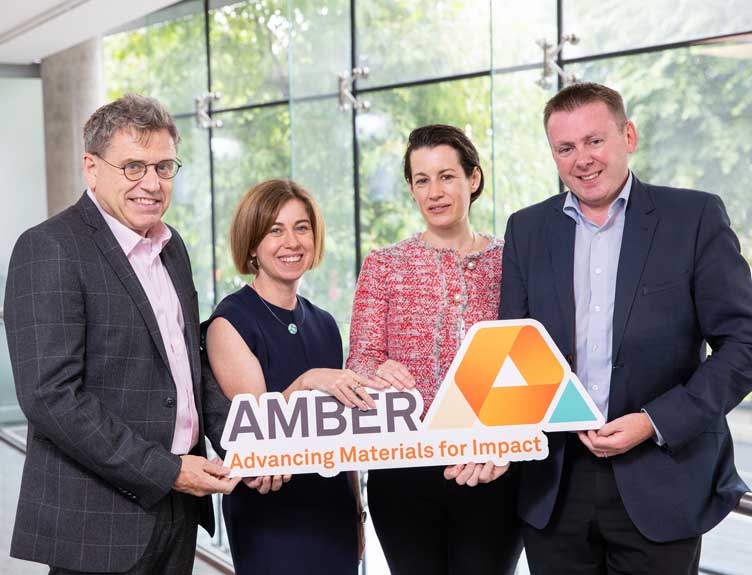AMBER to create 350 new research positions from 2019-2025

Pictured (L-R) Prof. Mick Morris, Director AMBER; Dr Lorraine Byrne, Executive Director AMBER; Dr Aoife Gallagher, Head of Innovation, RCSI; Prof. Fergal O’Brien, Professor of Bioengineering & Regenerative Medicine, RCSI and Deputy Director, AMBER.
AMBER, the SFI Research Centre for Advanced Materials and Bio-Engineering Research has today launched its second phase which will see 350 new research positions created between 2019 and 2025 across seven partner institutions.
RCSI was a founding partner of the AMBER Centre in 2013 with RCSI’s Professor of Bioengineering and Regenerative Medicine, Fergal O’Brien serving as Deputy Director of the Centre with specific responsibility in growing the materials for health remit. RCSI researchers Prof. Sally Ann Cryan, Prof. Andreas Heise, Dr Cathal Kearney, Prof. Donal O’Shea, Dr Oran Kennedy, Dr Ciara Murphy, Dr Cian O’Leary, Dr Caroline Curtin and Dr Annie Curtis are also funded as AMBER Principal Investigators.
This phase of the centre is being delivered via €40 million in funding over the next six years through the Science Foundation Ireland’s (SFI) Research Centres Programme, coupled with €77 million in cash and in-kind contributions which AMBER will raise in investment from industry and non-exchequer sources. The funding will grow the Centre’s world leading academic and industry orientated materials science research in critical and emerging sectors of the economy, such as ICT, MedTech, personalised and regenerative medicine, energy, sustainable materials and manufacturing technologies.
Minster for Business, Enterprise, and Innovation, Heather Humphreys TD said: “The second phase of AMBER will contribute hugely to the Government’s strategy to prepare now for tomorrow’s world, through plans like Future Jobs Ireland and Project Ireland 2040. The work done by AMBER previously has helped position Ireland as a world leader in research, further strengthening our global credibility across a number of different sectors.”
Professor Ray Stallings, Director of Research and Innovation, RCSI, said: “Through the second phase of AMBER, RCSI researchers will contribute to driving innovations in advanced healthcare materials that will lead to improvements in human health in Ireland and around the world. The quality of RCSI’s research is critical for AMBER in attracting and sustaining long term engagements with industry, competing for non-exchequer funding and tackling global challenges.”
Professor Fergal O’Brien, Deputy Director of AMBER and Professor of Bioengineering and Regenerative Medicine at RCSI, commented: “The launch of the second phase of AMBER will bring together clusters of researchers to work across the boundaries of traditional disciples, to drive advances in new sustainable products and technologies for society and solutions for industry. I am delighted that 10 RCSI faculty are now funded investigators in AMBER and I look forward to growing this number in the coming years. The expertise of RCSI researchers will be instrumental in driving the expansion of the materials for health and bioengineering remit of AMBER into the next decade.”
Professor Mark Ferguson, Director General Science Foundation Ireland and Chief Scientific Adviser to the Government of Ireland, said: “The SFI Research Centre AMBER has contributed hugely to fundamental and applied materials science research. In only a short period, AMBER has made incredible progress, in terms of increased academic and industrial collaboration, training PhD students for industry, winning competitive funding from the EU, producing excellent scientific results and public engagement. Science Foundation Ireland looks forward to continuing to support this world class centre, increasing our ability to positively impact both society and the economy through excellent scientific research.”
Health research areas where AMBER investigators are world leaders include biomaterials for tissue regeneration, additive manufacturing, bioprinting and scaffold mediated drug delivery. Between 2019 and 2025, they will facilitate the development of new engineered implants, leveraging the expertise of researchers in immunology and 2D materials. Expected impacts in the area of health includes the development of new therapies for the treatment of bone defects and heart attacks, peripheral nerve repair, joint repair and wound healing, as well as developing new methods for monitoring health.



